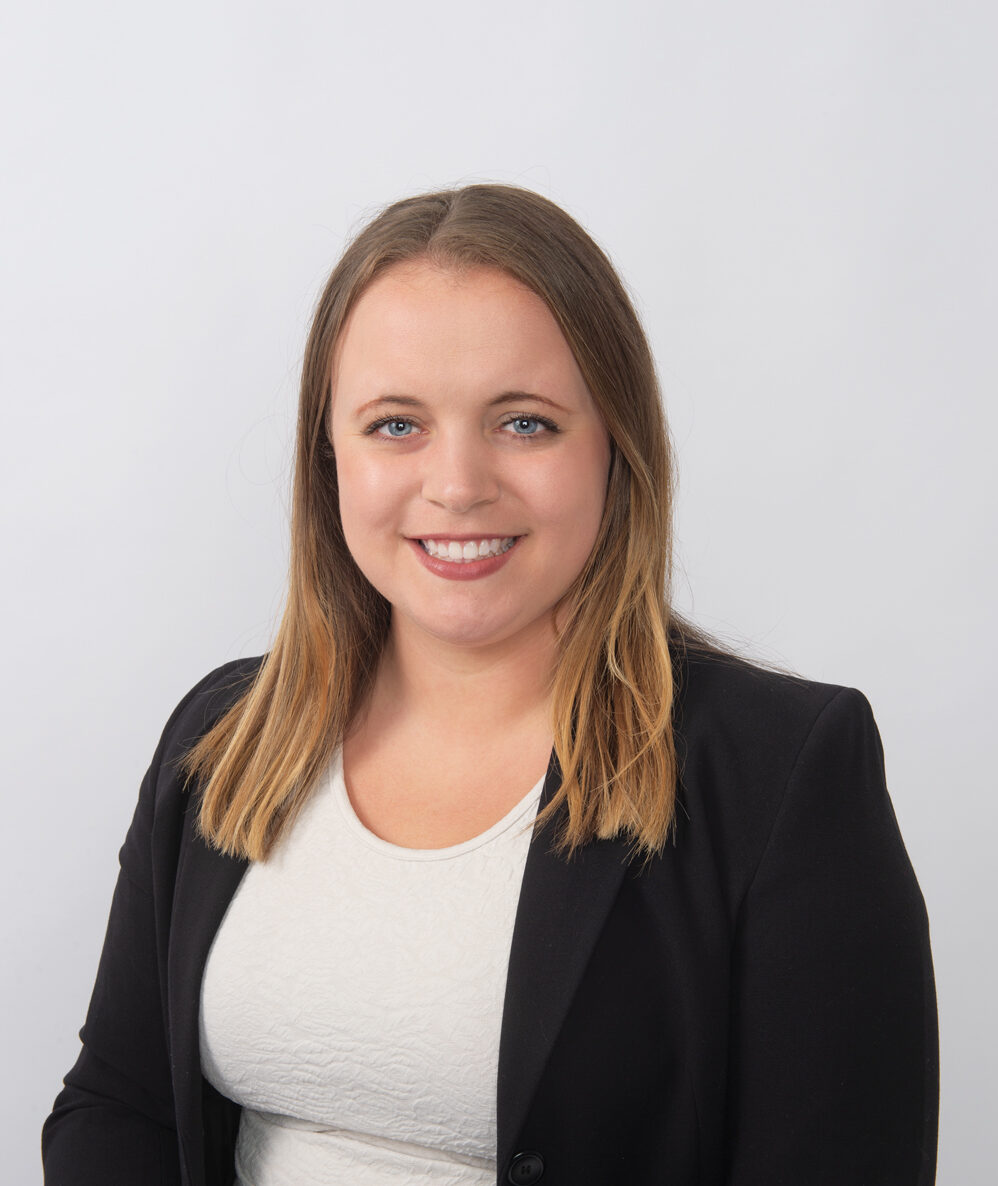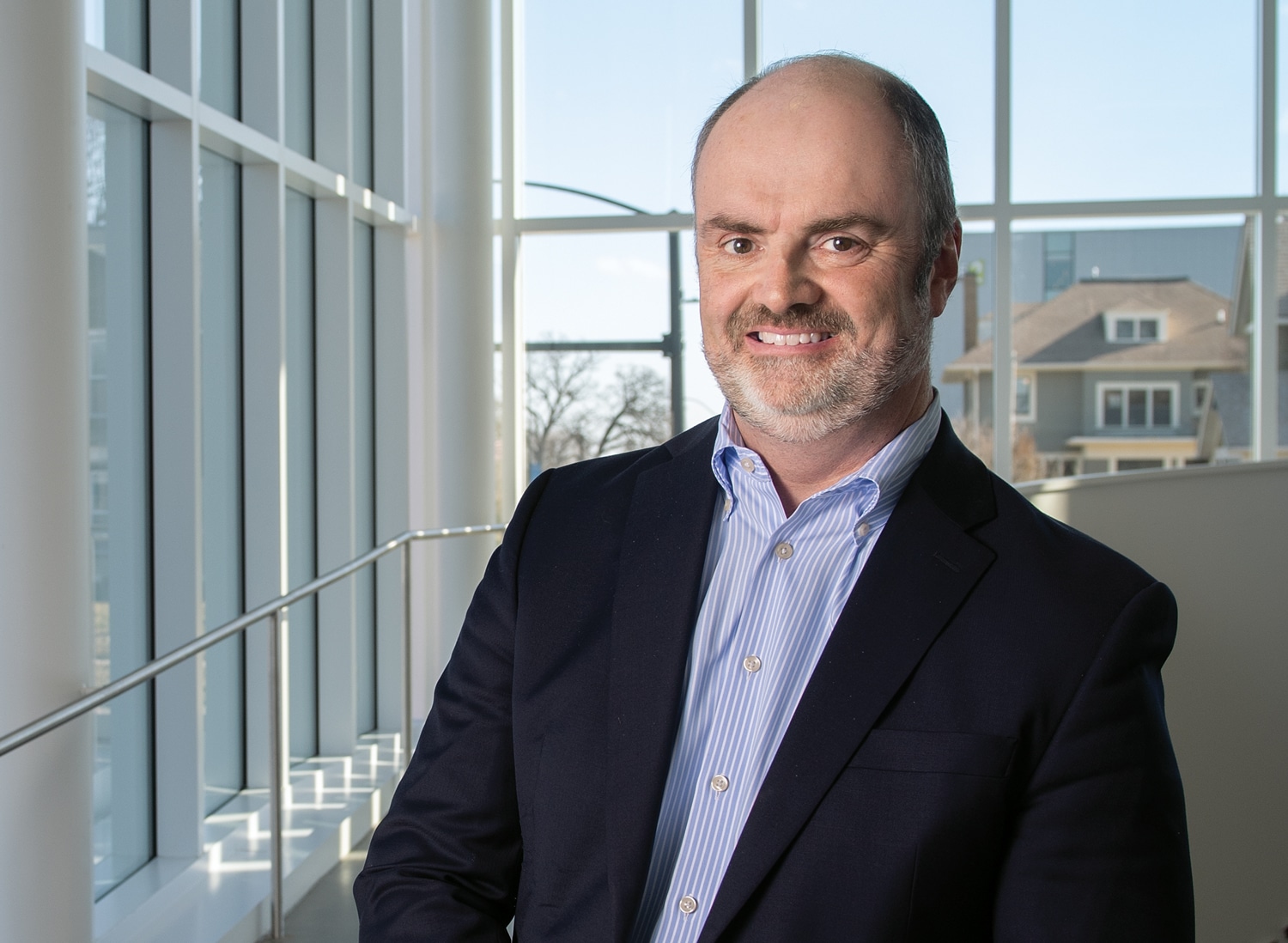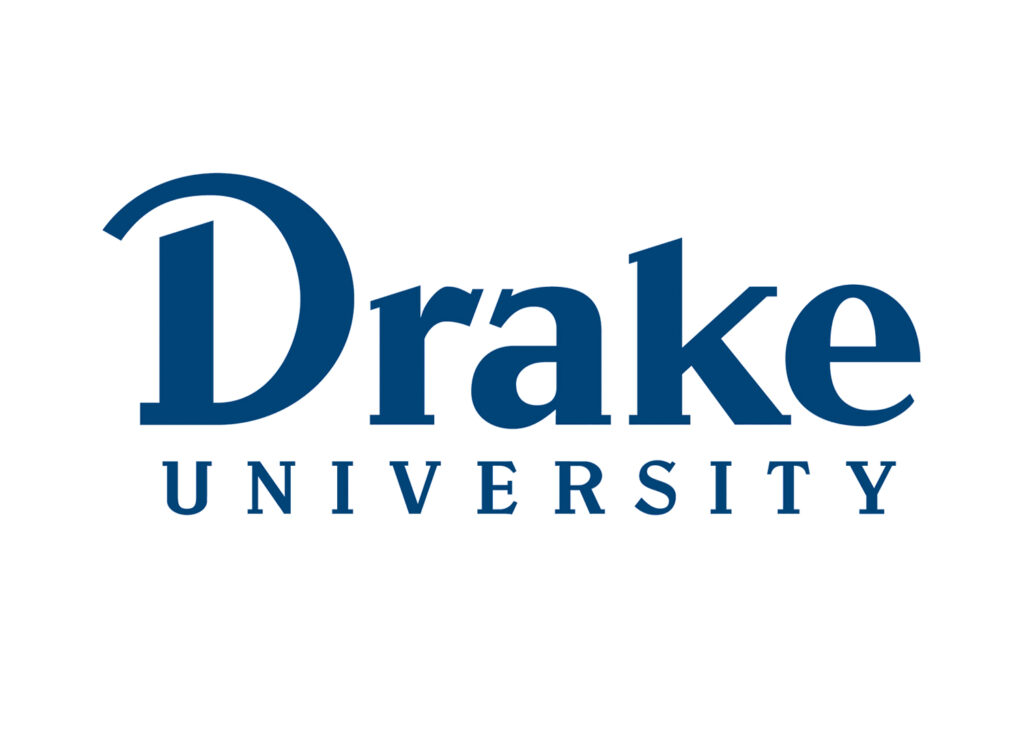A Closer Look: Matt Reed
Executive director, the Harkin Institute

Emily Barske Wood Apr 19, 2024 | 6:00 am
10 min read time
2,352 wordsA Closer Look, All Latest News, EducationFormer U.S. Sen. Tom Harkin, along with his wife, Ruth, founded the Harkin Institute in 2013 as a nonpartisan policy nonprofit focused on labor and employment, people with disabilities, retirement security, and wellness and nutrition.
The institute is already seen by many as a global leader in disability inclusion. In 2020, 30 years after the passage of the Americans with Disabilities Act, the nonprofit completed construction of its new headquarters on Drake University’s campus. Architects employed universal design to make it one of the most accessible buildings in the country.
The organization’s new executive director wants the institute to be just as well recognized for its other policy focuses. Matt Reed was named the organization’s new leader last August. He previously worked in higher education at several institutions on the East Coast.
We recently sat down with Reed to learn more about him and his goals for the Harkin Institute.
The Q&A has been edited for clarity and brevity.
Tell me about what drew you to this position.
Prior to this position, I worked in community college administration for about 20 years. It was about helping people get into the middle class. The Harkin Institute is also about helping people get into, and stay in, the middle class – but it’s from a different angle. After 20 years of largely the same work, it felt like it was time to do something different. Part of what was appealing, when I interviewed with Tom and Ruth Harkin on Zoom the first time, they indicated that they want the institute to get bigger and more influential.
On the East Coast where I was, community colleges in the last few years have endured a lot of financial struggles. I spent a lot of time with stagnant or declining budgets – trying to do more with less. Coming here, they’re in building mode. They want to increase their staffing, their impact and their effectiveness in the world. I thought, “Oh, that sounds like much more fun.” Then add to that, Iowa is just a very affordable place to live.
Remind me where you grew up. Are you from that area?
I grew up outside of Rochester, N.Y. So I’m familiar with winters. But the winters there are a little different than here. There’s not as much snow here, but my goodness, did it get cold. A couple of weeks in January, I thought, oof, this is serious. The wind is a real thing.
What got you interested in education?
I originally wanted to be a political science professor. So I went to graduate school at Rutgers to get my doctorate in political science. I had to kind of scrape my way into the industry in the late ’90s. Full-time faculty positions in the liberal arts did not grow on trees. I found my way to DeVry University in New Jersey. I spent a few years teaching full time there, across a range of disciplines.
I figured out fairly quickly I wasn’t going to publish my way out of there because I was teaching so much. But they were expanding quickly and they needed people to move into management roles. And so I thought, “Well, let me try that.” I discovered that I was pretty good at it.
I did that for a few years, but DeVry is a for-profit college. The higher I got in the organization, the more I saw decisions being made based on profitability rather than what was good for students, and that bothered me. I found a dean’s role at the County College of Morris in North Jersey. I moved to that and spent the next 20 years in the community college world.
I loved the mission and loved the students. Sometimes I got frustrated by the budgets. I discovered this and thought, “Well, now, that’s a really interesting and different way to do the same thing.” We’re trying to open up middle-class jobs to folks with disabilities. Make sure when they retire, they can maintain a dignified standard of living in retirement. Make sure they can be healthy. Make sure they’re treated fairly. All the kinds of things I was doing in the community college world, but just from a different angle. It has been a refreshing change.
What would you say are the biggest ways you’re using your education experience here?
The Harkin Institute is affiliated with Drake University. Having spent 20 years in higher-ed administration, I kind of speak that language, so I’m able to work with Drake easily. I’ve been working with Sue Mattison, who is the provost at Drake, and we’re trying to put together a project on universal design for learning, which is the application of universal design principles to teaching.
Things like, how you do PowerPoints in ways that students with disabilities can access them from the get-go, instead of accommodating after the fact. So far the idea has been well received, but we’re trying to find the funding for it. I would love to help Drake become even more accessible than it already is.
In terms of employment, a lot of jobs that pay well require some kind of postsecondary education, whether it’s a four-year degree, a two-year degree or a certificate. So I want to make sure that those credentials are accessible to folks who have disabilities, whether that means universal design for learning, or it means how you design a campus or it might mean some of the financial side of things.
For example, there are income limits and savings limits for people who get disability benefits. Those savings limits frequently prevent them from moving up in the world. They can’t afford to get a car that’s reliable enough to keep a job. They can’t afford a security deposit on an apartment.
It’s perverse. The income limit of $2,500 was set in the ’80s. If you have more than $2,500 saved, you lose all of your benefits. What kind of car can you get for $2,500 in 2024? The limit was set back in the ’80s – it hasn’t changed. The economy has. So those are areas where, in policy research that we do, we want to bring these issues to light for legislators. Let’s set a limit that allows people to actually participate in the world and allow them to work. It’s not about welfare or anything like that. These are people who want to work, who want to make a living, pay taxes on a home, do all the things that middle-class Americans like to do – and they’re being, more or less, forbidden from doing it.
I think there’s a bipartisan appeal. On the left, there’s a concern for inclusion. On the right, I think there’s a general sense that working is good, saving is good. Let’s put those together and get some of these barriers out of the way so folks can work, save and support families.
What do you think the business community needs to be more aware of when it comes to inclusion of people with disabilities?
We actually use the Harkin Institute building as a visual aid. We’ve had CEOs of some fairly large local companies come through and see the kinds of measures that we’ve taken in this building to get ideas for their own organizations. Typically the response when they see things is, “Oh, that’s easy.”
It’s really not difficult or expensive. My favorite example in the building is that most of the electrical outlets in the wall are about a foot higher than they would typically be, so someone in a wheelchair can reach them easily. What does that cost? If you’re putting in the electrical outlet anyway, putting it in a foot higher is not any harder or any more expensive, but it makes a meaningful difference for people who have mobility issues. Using high-contrast colors for your signage. Well, if you have signage anyway, how hard is that? It’s just a matter of thinking of it.
There’s this sort of knee-jerk response that some people have, “Oh, accommodating everybody is expensive. We couldn’t afford it.” I think a lot of that is overstated. Many accommodations are extremely low cost, if not free, and they pay off over time. Companies are competing for talent. If you are a company that is accommodating, you have a larger talent pool from which to draw.
What would you say are some of your biggest goals for the organization?
In areas like retirement security policy, I want us to be mentioned in the same breath as institutions like Brookings. Right now, the national policy debates are pretty much New York and D.C., and maybe California. The Midwest is largely overlooked in a lot of these conversations. That needs to change, and I think the Harkin Institute is really well positioned to be part of that change.
In September, when I’d been here about a month, we had our first retirement security symposium in D.C. We’ve all heard the story that Social Security is going to go broke in 10 years. That story is mostly false. But people don’t know why it’s false, and they don’t know how easy it would be to fix that. I heard a few of the experts speak, including the chief actuary at the Social Security Administration. When they talked about how this came to be and how we could fix it, I realized none of what they were saying was part of the national debate.
My concern is the middle-class person in Des Moines. When they retire, are they going to be fine? I want to make sure that folks who spent their lives teaching, or plumbing or farming, or just working a whole bunch of different jobs, can be secure and dignified in their retirement. There are policies that, depending on how they go, could make that easier or harder. I would like us to inform the discussion with research-based solutions.
As it relates to the work on the retirement side, what should the business leaders be focused on to ensure that the middle class can retire successfully?
There is a large financial services sector in this area. Until I went to the retirement security symposium, in my mind, retirement and taking Social Security happened at the same time. But you don’t have to, and the longer you wait to take Social Security, the higher the benefit you get for the rest of your life. So if you retire at 65 and you can find a way to put off taking Social Security until you’re 70, you will have a much better-funded, more secure retirement after 70. But what do you do for those five years? That’s where the financial services folks come in. That’s where looking at policy changes around short-term annuities or other ways to use 401(k)s that can allow people who don’t have millions and millions to have secure, dignified, safe retirements.
I could see tremendous benefit for the recipients as well as a really constructive role for the financial services companies in town, and I’d like to work with them. They have an experience in these fields that we don’t, and they have capital. I’m eager to work with them to create options and publicize options that don’t currently exist. My concern is, can we create a policy environment in which it is easier for these various companies to offer options that will be really constructive and helpful?
In your previous roles with community colleges, what were you seeing in terms of workforce training that changed over the course of your two decades of work?
Especially in the last 10 years or so, in the most high-demand fields, it was incredibly hard to hire faculty. I’m thinking of areas like cybersecurity, nursing and engineering. It was very difficult to hire faculty because community college salaries for faculty were generally way below industry salaries in those fields. So if you found someone who could teach cybersecurity at a high level, I had the experience of quoting them the salary we could offer, having them sort of laugh and that was the end of the conversation.
If industries were willing to offset some of that by subsidizing or offering bonuses or lending out employees on a part-time basis, that would go a long way. To use a farming metaphor, if you eat your seed corn now, then next year, you won’t have a crop. Your future employees come from education. If we’re not educating them because we can’t hire faculty, then you’re going to have an employee shortage. If you shut down your community college nursing program because it’s expensive, good luck finding nurses for your hospitals. These high-demand programs are more expensive to run than traditional academic programs like history, psychology or English. But the funding largely has not kept up. Again, I’m not speaking about schools locally, because I don’t know that – all of this is based on my East Coast experience.
What are some of the things that you’re most passionate about personally?
I’m a huge fan of live music and quirky music. My kids laugh at my taste. I did college radio in the ’80s. I’ve got this lingering love for ’80s and ’90s indie rock. There’s a new band out in New Zealand called the Beths that plays very much in the ’90s indie rock style, and I’m obsessed with them. I’m also a big jazz fan.
And I love silly comedies. The dumber, the better. After a whole day of policy discussion and whatnot, silliness is therapeutic for me.
Is there anything that you’re reading, watching or listening to that you’d recommend to other people?
I’m very aware that my tastes are idiosyncratic. So I don’t want to push them on other people.
But recently I went to the First Friday event at Mainframe and loved it. It was just this wonderful cross section of humanity.
AT A GLANCE
Age: 55
Hometown: Rochester, N.Y.
Family: Wife, Carolyn, and two children, Jessica and Kyle
Education: Bachelor’s degree in political science from Williams College (Massachusetts) and Ph.D. in political science from Rutgers University
Contact: matthew.reed@drake.edu

Emily Barske Wood
Emily Wood is special projects editor at Business Record. She covers nonprofits and philanthropy, HR and leadership, and diversity, equity and inclusion.










